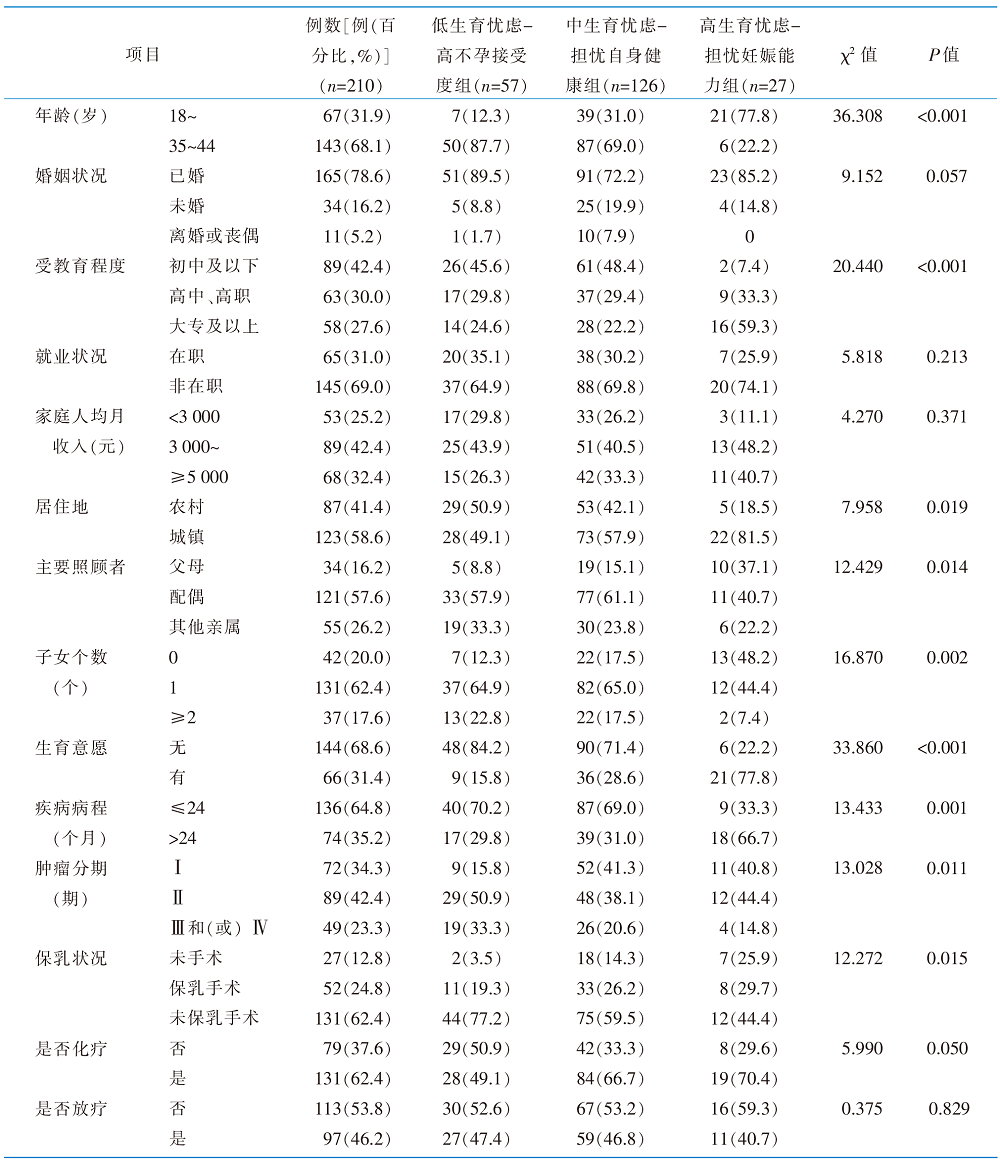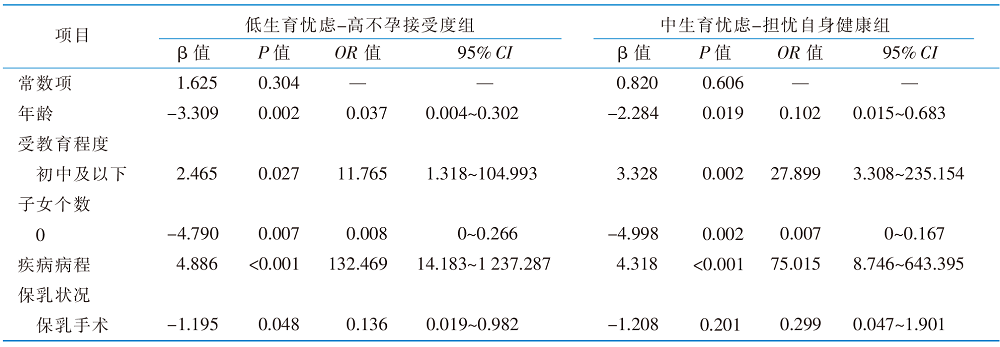


中华护理杂志 ›› 2023, Vol. 58 ›› Issue (16): 1989-1995.DOI: 10.3761/j.issn.0254-1769.2023.16.012
刘翠婷( ), 陈良英, 陈春莺, 高惠婷, 周红娟, 刘翠萍, 丘丽娟
), 陈良英, 陈春莺, 高惠婷, 周红娟, 刘翠萍, 丘丽娟
收稿日期:2023-01-12
出版日期:2023-08-20
发布日期:2023-08-14
作者简介:刘翠婷:女,硕士,讲师,教研室主任,E-mail:liuct1106@foxmail.com
基金资助:
LIU Cuiting( ), CHEN Liangying, CHEN Chunying, GAO Huiting, ZHOU Hongjuan, LIU Cuiping, QIU Lijuan
), CHEN Liangying, CHEN Chunying, GAO Huiting, ZHOU Hongjuan, LIU Cuiping, QIU Lijuan
Received:2023-01-12
Online:2023-08-20
Published:2023-08-14
摘要:
目的 基于潜在剖面分析,了解青年女性乳腺癌患者生育忧虑水平的类别特征,探究不同类别乳腺癌患者生育忧虑水平的影响因素。 方法 通过横断面研究,采用便利抽样法,选取2022年1月—9月在福建省4所三级甲等医院就诊的225例青年女性乳腺癌患者作为调查对象。采用一般资料调查表、癌症后生育忧虑量表进行调查。 结果 潜在剖面分析结果显示,青年女性乳腺癌患者生育忧虑特征可分为3个潜在类别:低生育忧虑-高不孕接受度组(26.56%)、中生育忧虑-担忧自身健康组(60.49%)、高生育忧虑-担忧妊娠能力组(12.95%)。多元Logistic回归分析结果显示,年龄、子女个数、受教育程度、保乳状况和疾病病程是青年女性乳腺癌患者生育忧虑的影响因素(P<0.05)。 结论 青年女性乳腺癌患者生育忧虑水平存在明显的异质性,建议医护人员根据不同类别患者生育忧虑的特征开展心理疏导、生育信息支持及生育能力保护等干预措施,以缓解患者的生育忧虑。
刘翠婷, 陈良英, 陈春莺, 高惠婷, 周红娟, 刘翠萍, 丘丽娟. 青年女性乳腺癌患者生育忧虑特征的潜在剖面分析及护理对策[J]. 中华护理杂志, 2023, 58(16): 1989-1995.
LIU Cuiting, CHEN Liangying, CHEN Chunying, GAO Huiting, ZHOU Hongjuan, LIU Cuiping, QIU Lijuan. Latent profile analysis of reproductive concerns characteristics in young female breast cancer patients[J]. Chinese Journal of Nursing, 2023, 58(16): 1989-1995.
 |
表1 青年女性乳腺癌患者的一般资料和生育忧虑潜在类别的单因素分析[例(百分比,%)]
Table 1 General data and univariate analysis of potential categories of reproductive concerns among young female breast cancer patients[case(percentage,%)]
 |

图1 青年女性乳腺癌患者生育忧虑3个潜在类别的特征分布
Figure 1 The characteristic distribution of 3 potential categories of reproductive concerns among young female breast cancer patients
 |
表4 青年女性乳腺癌患者生育忧虑潜在类别的多元Logistic回归分析
Table 4 Results of the univariate logistic analysis of the reproductive concerns classes of young female breast cancer patients
 |
| [1] |
Lei S, Zheng R, Zhang S, et al. Breast cancer incidence and mortality in women in China:temporal trends and projections to 2030[J]. Cancer Biol Med, 2021, 18(3):900-909.
DOI URL |
| [2] |
Siegel RL, Miller KD, Fuchs HE, et al. Cancer statistics,2022[J]. CA Cancer J Clin, 2022, 72(1):7-33.
DOI URL |
| [3] |
巨洁, 张罗欣, 岳健, 等. 年轻乳腺癌患者生育需求现况调查[J]. 中华肿瘤杂志, 2020, 42(5):408-412.
PMID |
|
Ju J, Zhang LX, Yue J, et al. An investigation of the fertility needs of young patients with breast cancer[J]. Chin J Oncol, 2020, 42(5):408-412.
DOI PMID |
|
| [4] |
Chemerinski A, Cameron K, Sammel M, et al. Relationship of menopausal symptoms and ovarian reserve in reproductive-aged cancer survivors[J]. J Cancer Surviv, 2020, 14(5):607-613.
DOI PMID |
| [5] |
Benedict C, Thom B, Friedman DN, et al. Fertility information needs and concerns post-treatment contribute to lowered quality of life among young adult female cancer survivors[J]. Support Care Cancer, 2018, 26(7):2209-2215.
DOI PMID |
| [6] |
尹奎, 彭坚, 张君. 潜在剖面分析在组织行为领域中的应用[J]. 心理科学进展, 2020, 28(7):1056-1070.
DOI |
|
Yin K, Peng J, Zhang J. Latent profile analysis in the field of organizational behavior[J]. Adv Psychol Sci, 2020, 28(7):1056-1070.
DOI URL |
|
| [7] |
张贤贤, 张利霞, 贾智慧, 等. 夫妻自我表露在青年乳腺癌患者癌症复发恐惧干预中的应用研究[J]. 中华护理杂志, 2019, 54(11):1610-1614.
DOI |
| Zhang XX, Zhang LX, Jia ZH, et al. Application and effect eva-luation of marital self-disclosure intervention on the fear of cancer recurrence in young breast cancer patients[J]. Chin J Nurs, 2019, 54(11):1610-1614. | |
| [8] | 倪平, 陈京立, 刘娜. 护理研究中量性研究的样本量估计[J]. 中华护理杂志, 2010, 45(4):378-380. |
| Ni P, Chen JL, Liu N. The sample size estimation in quantitative nursing research[J]. Chin J Nurs, 2010, 45(4):378-380. | |
| [9] | 于雅, 刘素婷, 陶元玲, 等. 育龄期乳腺癌患者自我表露与夫妻亲密关系对心理弹性与生育忧虑的影响[J]. 中华护理教育, 2021, (7):644-649. |
| Yu Y, Liu ST, Tao YL, et al. The mechanism of self-disclosure and marital intimacy in breast cancer patients in relation to their mental resilience and reproductive concerns after cancer[J]. Chin J Nurs Educ, 2021, 18(7):644-649. | |
| [10] | 康婷婷, 郑蔚, 刘梦丽, 等. 康复期年轻女性乳腺癌患者生育忧虑现状及其对生命质量的影响[J]. 中国慢性病预防与控制, 2021, 29(5):387-390. |
| Kang TT, Zheng W, Liu ML, et al. Fertility anxiety in convalescent young women with breast cancer and its effect on quality of life[J]. Chin J Prev Contr Chron Dis, 2021, 29(5):387-390. | |
| [11] |
Gorman JR, Su HI, Pierce JP, et al. A multidimensional scale to measure the reproductive concerns of young adult female cancer survivors[J]. J Cancer Surviv, 2014, 8(2):218-228.
DOI PMID |
| [12] | 乔婷婷, 陈丹丹, 郑蔚, 等. 癌症后生育忧虑量表的汉化及信效度研究[J]. 中华护理杂志, 2016, 51(12):1509-1514. |
| Qiao TT, Chen DD, Zheng W, et al. Translation and reliability and validity of the Chinese version of the Reproductive Concerns After Cancer Scale(RCAC)[J]. Chin J Nurs, 2016, 51(12):1509-1514. | |
| [13] |
周丹, 蒋小平, 陈澜, 等. 恶性肿瘤患儿家庭管理特征的潜在剖面分析[J]. 中华护理杂志, 2022, 57(20):2493-2501.
DOI |
|
Zhou D, Jiang XP, Chen L, et al. Latent profile analysis of family management characteristics in children with malignant tumor[J]. Chin J Nurs, 2022, 57(20):2493-2501.
DOI |
|
| [14] | Bártolo A, Santos IM, Valério E, et al. Depression and health-related quality of life among young adult breast cancer patients:the mediating role of reproductive concerns[J]. J Ado-lesc Young Adult Oncol, 2020, 9(3):431-435. |
| [15] |
高文君, 黄慧, 田凤美, 等. 育龄期甲状腺癌女性患者生育忧虑的潜在剖面分析[J]. 中华护理杂志, 2022, 57(22):2738-2744.
DOI |
|
Gao WJ, Huang H, Tian FM, et al. Latent profile analysis of reproductive concerns among female thyroid cancer patients at reproductive age[J]. Chin J Nurs, 2022, 57(22):2738-2744.
DOI |
|
| [16] | 王娟, 董诗奇, 唐涵, 等. 疾病进展恐惧对青年淋巴瘤患者生育忧虑的影响研究[J]. 解放军护理杂志, 2021, 38(11):4-7. |
| Wang J, Dong SQ, Tang H, et al. Fear of progression and re-productive concerns in young adult with lymphoma[J]. Nurs J Chin PLA, 2021, 38(11):4-7. | |
| [17] | 任海玲, 焦娜娜, 赵岳. 育龄期乳腺癌患者生育忧虑现状及影响因素研究[J]. 中国护理管理, 2022, 22(3):359-363. |
| Ren HL, Jiao NN, Zhao Y. The current situation and influencing factors of reproductive concerns in patients with breast cancer in breeding age[J]. Chin Nurs Manag, 2022, 22(3):359-363. | |
| [18] | Moradinazar M, Marzbani B, Shahebrahimi K, et al. Hormone the-rapy and factors affecting fertility of women under 50-year-old with breast cancer[J]. Breast Cancer(Dove Med Press), 2019, 11:309-319. |
| [19] |
Bártolo A, Neves M, Carvalho B, et al. Fertility under uncertainty:exploring differences in fertility-related concerns and psychosocial aspects between breast cancer survivors and non-cancer infertile women[J]. Breast Cancer, 2020, 27(6):1177-1186.
DOI |
| [20] |
Bártolo A, Santos IM, Valério E, et al. The European Portuguese version of the Reproductive Concerns After Cancer Scale(RCACS):a psychometric validation for young adult female cancer survivors[J]. Eur J Oncol Nurs, 2020, 47:101781.
DOI URL |
| [21] | 张罗欣. 年轻乳腺癌女性生育需求现况调查[D]. 北京: 北京协和医学院, 2015. |
| Zhang LX. An investigation of the fertility needs of young patients with breast cancer[D]. Beijing: Peking Union Medical College, 2015. | |
| [22] |
肖盼盼, 王璐, 孙倩, 等. 青年癌症患者生育相关心理痛苦的研究进展[J]. 中华护理杂志, 2020, 55(7):1097-1101.
DOI |
| Xiao PP, Wang L, Sun Q, et al. Research progress of childbearing related psychological distress in young cancer patients[J]. Chin J Nurs, 2020, 55(7):1097-1101. | |
| [23] | 夏群伟, 傅红波, 俞怡, 等. 乳腺癌患者生活质量状况及影响因素分析[J]. 中国妇幼保健, 2021, 36(5):1132-1135. |
| Xia QW, Fu HB, Yu Y, et al. Analysis on life quality and influencing factors in breast cancer patients[J]. Matern Child Heal Care China, 2021, 36(5):1132-1135. | |
| [24] | 谭艳, 李旭英, 樊溶榕, 等. 育龄期乳腺癌患者生育忧虑现状及影响因素分析[J]. 护理实践与研究, 2022, 19(1):10-16. |
| Tan Y, Li XY, Fan RR, et al. Current situation and influencing factors of fertility anxiety in breast cancer patients of childbearing age[J]. Nurs Pract Res, 2022, 19(1):10-16. | |
| [25] |
Ljungman L, Ahlgren J, Petersson L, et al. Sexual dysfunction and reproductive concerns in young women with breast cancer:type,prevalence,and predictors of problems[J]. Psycho-Oncology, 2018, 27(12):2770-2777.
DOI PMID |
| [1] | 姚鑫, 文司棋, 沈媛媛, 宋梓菱, 陈燕燕, 张佩华, 黄小琼. 护士组织沉默现状及潜在剖面分析[J]. 中华护理杂志, 2023, 58(8): 921-928. |
| [2] | 郭员志, 张红梅, 赵培, 王琦, 李玉环, 王淑芬, 于洋. 乳腺癌术后淋巴水肿预防与护理的循证实践[J]. 中华护理杂志, 2023, 58(7): 773-780. |
| [3] | 武佩佩, 王盈, 沈傲梅, 强万敏, 杨惠莉, 刘鑫鑫. 乳腺癌相关淋巴水肿患者综合消肿治疗依从性的质性研究[J]. 中华护理杂志, 2023, 58(7): 781-787. |
| [4] | 何丽, 胡露红, 崔金锐, 邓妍, 褚彦香, 王玮荻, 王倩云. 乳腺癌化疗患者自我倡权能力现状及影响因素分析[J]. 中华护理杂志, 2023, 58(7): 788-793. |
| [5] | 刘英, 甄倩, 王晓庄, 张皎霄, 张亚平, 王德欣, 王熙棋. 乳腺癌患者和配偶的创伤后成长及与积极心理资本的关系[J]. 中华护理杂志, 2023, 58(7): 794-799. |
| [6] | 吴媛, 张玉玺, 王楠楠, 张慧超. 乳腺癌患者参与同伴支持体验质性研究的Meta整合[J]. 中华护理杂志, 2023, 58(7): 800-807. |
| [7] | 荆凤, 王园园, 邢唯杰, 徐蕾, 胡雁. 乳腺癌患者芳香化酶抑制剂诱导的骨关节症状预防和管理的证据总结[J]. 中华护理杂志, 2023, 58(7): 808-815. |
| [8] | 周彦君, 李秋月, 胡宇乐, 杨浩杰, 赵芳, 梁涛. 乳腺癌蒽环类化疗相关心脏毒性早期识别及预防的研究进展[J]. 中华护理杂志, 2023, 58(7): 816-821. |
| [9] | 蒋璐璐, 王喜益, 徐洁慧, 邬燕伟, 胡韵. 智能交互式护理信息支持系统的构建及在乳腺癌患者中的应用研究[J]. 中华护理杂志, 2023, 58(6): 654-661. |
| [10] | 张旭, 孙迪, 李小寒, 李娇娇, 秦楠, 李贺吉. 癌症患者复发恐惧的潜在剖面分析[J]. 中华护理杂志, 2023, 58(6): 662-669. |
| [11] | 董朝晖, 卢惠娟, 陆箴琦, 张晓菊, 张玉侠. 癌症患者社会疏离体验的质性研究[J]. 中华护理杂志, 2023, 58(6): 670-675. |
| [12] | 吴傅蕾, 袁长蓉, 杨瑒, 尚美美, 闫荣, 郑叶平, 钮美娥, 黄青梅. 乳腺癌患者化疗期症状群困扰风险预测模型的构建与评价[J]. 中华护理杂志, 2023, 58(6): 676-681. |
| [13] | 张丰翼, 刘素婷, 张立力. 决策辅助工具在癌症患者生育力保护中的应用进展[J]. 中华护理杂志, 2023, 58(6): 689-694. |
| [14] | 李珍, 周梦, 陈露娜, 曲瑞杰, 陈思诺, 王惠玲. 癌症患者工作生活质量量表的汉化及信效度检验[J]. 中华护理杂志, 2023, 58(6): 695-700. |
| [15] | 苏瑾, 杨巧红, 李耀霞, 熊佳铭, 邱玮瑜. 中青年急性心肌梗死患者早期康复阶段恐惧疾病进展分型及影响因素分析[J]. 中华护理杂志, 2023, 58(4): 406-413. |
| 阅读次数 | ||||||
|
全文 |
|
|||||
|
摘要 |
|
|||||